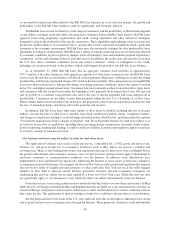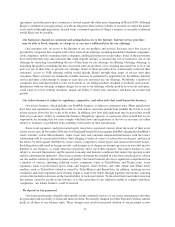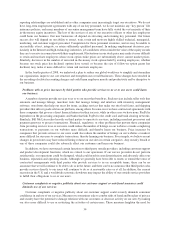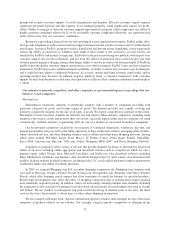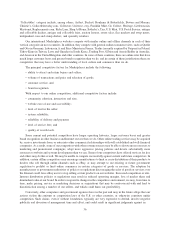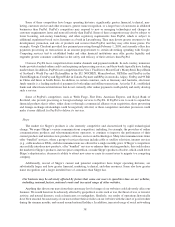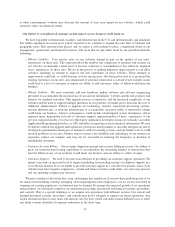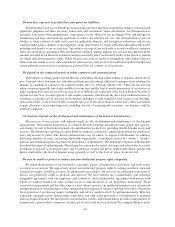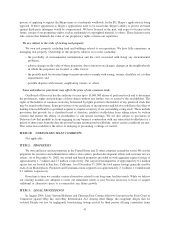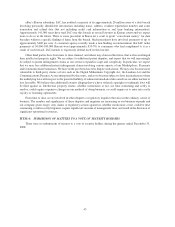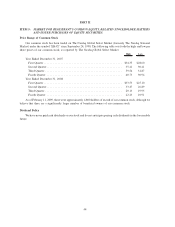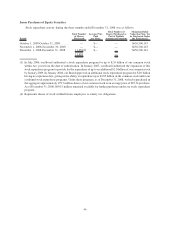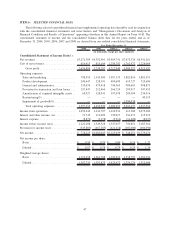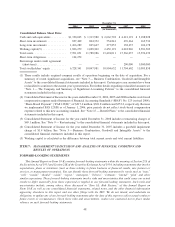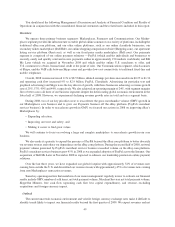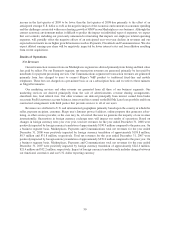eBay 2008 Annual Report Download - page 48
Download and view the complete annual report
Please find page 48 of the 2008 eBay annual report below. You can navigate through the pages in the report by either clicking on the pages listed below, or by using the keyword search tool below to find specific information within the annual report.We may have exposure to greater than anticipated tax liabilities.
The determination of our worldwide provision for income taxes and other tax liabilities requires estimation and
significant judgment and there are many transactions and calculations where the ultimate tax determination is
uncertain. Like many other multinational corporations, we are subject to tax in multiple U.S. and foreign tax
jurisdictions and have structured our operations to reduce our effective tax rate. Our determination of our tax
liability is always subject to audit and review by applicable domestic and foreign tax authorities, and we are
currently undergoing a number of investigations, audits and reviews by taxing authorities throughout the world,
including with respect to our tax structure. Any adverse outcome of any such audit or review could have a negative
effect on our business, operating results and financial condition, and the ultimate tax outcome may differ from the
amounts recorded in our financial statements and may materially affect our financial results in the period or periods
for which such determination is made. While we have take reserves based on assumptions and estimates that we
believe are reasonable to cover such eventualities, these reserves may prove to be insufficient in the event that any
taxing authority is successful in asserting tax positions that are contrary to our positions.
We depend on the continued growth of online commerce and communications.
The business of selling goods over the Internet, particularly through online trading, is dynamic and relatively
new. Concerns about fraud, privacy, and other problems may discourage additional consumers from adopting the
Internet as a medium of commerce. In countries such as the U.S., Germany and the U.K., where our services and
online commerce generally have been available for some time and the level of market penetration of our services is
high, acquiring new users for our services may be more difficult and costly than it has been in the past. In order to
expand our user base, we must appeal to and acquire consumers who historically have used traditional means of
commerce to purchase goods and may prefer Internet analogues to such traditional retail means to our offerings,
such as the retailer’s own website. If these consumers prove to be less active than our earlier users, and we are unable
to gain efficiencies in our operating costs, including our cost of acquiring new customers, our business could be
adversely impacted.
Our business depends on the development and maintenance of the Internet infrastructure.
The success of our services will depend largely on the development and maintenance of the Internet
infrastructure. This includes maintenance of a reliable network backbone with the necessary speed, data capacity,
and security, as well as timely development of complementary products, for providing reliable Internet access and
services. The Internet has experienced, and is likely to continue to experience, significant growth in the numbers of
users and amount of traffic. The Internet infrastructure may be unable to support such demands. In addition,
increasing numbers of users, increasing bandwidth requirements, or problems caused by “viruses,” “worms,”
malware and similar programs may harm the performance of the Internet. The backbone computers of the Internet
have been the targets of such programs. The Internet has experienced a variety of outages and other delays as a result
of damage to portions of its infrastructure, and it could face outages and delays in the future. These outages and
delays could reduce the level of Internet usage generally as well as the level of usage of our services.
We may be unable to protect or enforce our own intellectual property rights adequately.
We regard the protection of our trademarks, copyrights, patents, domain names, trade dress, and trade secrets
as critical to our success. We aggressively protect our intellectual property rights by relying on federal, state and
common law rights, as well as a variety of administrative procedures. We also rely on contractual restrictions to
protect our proprietary rights in products and services. We have entered into confidentiality and invention
assignment agreements with our employees and contractors, and confidentiality agreements with parties with
whom we conduct business in order to limit access to and disclosure of our proprietary information. These
contractual arrangements and the other steps we have taken to protect our intellectual property may not prevent
misappropriation of our technology or deter independent development of similar technologies by others. We pursue
the registration of our domain names, trademarks, and service marks in the U.S. and internationally. Effective
trademark, copyright, patent, domain name, trade dress, and trade secret protection is very expensive to maintain
and may require litigation. We must protect our trademarks, patents, and domain names in an increasing number of
jurisdictions, a process that is expensive and may not be successful in every location. For example, Skype is in the
40


